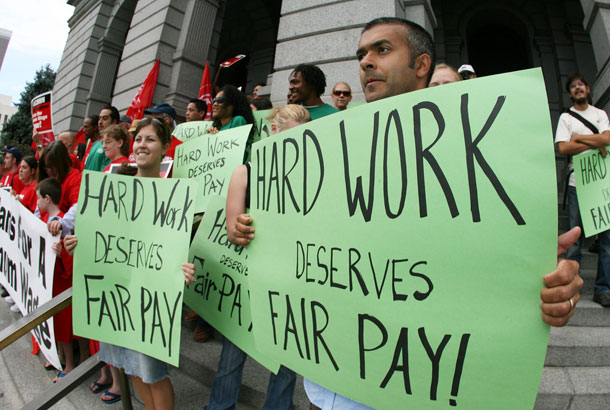If you asked around the office for opinions on the current Presidential Election (Don’t! Nothing good will come of that!), the only thing everyone might agree on is that we can’t trust politicians. As the old saying goes, “Campaign promises are like marriage vows. They are made at the beginning…but are quickly forgotten” (Dick Gregory).
 Political scientists have been studying campaign promises for almost 50 years, and the results are remarkably consistent. Most of the literature suggests that presidents make at least a “good faith” effort to keep an average of about two-thirds of their campaign promises.[1] If this research is correct, then the HR landscape may be in for some big changes regardless of who wins in November, starting with the issue of minimum wage. The federal minimum wage has been $7.25 an hour since 2009, and bills in Congress to change it have not been supported. This election, however, may be the deciding factor.
Political scientists have been studying campaign promises for almost 50 years, and the results are remarkably consistent. Most of the literature suggests that presidents make at least a “good faith” effort to keep an average of about two-thirds of their campaign promises.[1] If this research is correct, then the HR landscape may be in for some big changes regardless of who wins in November, starting with the issue of minimum wage. The federal minimum wage has been $7.25 an hour since 2009, and bills in Congress to change it have not been supported. This election, however, may be the deciding factor.
The Democrats have agreed to a party platform calling for a nationwide wage floor of $15 an hour.[2] Hillary Clinton’s website shows that the candidate doesn’t exactly agree with the party, but she does believe a hefty increase is in order. According to the site “At $7.25 per hour, the federal minimum wage isn’t nearly enough to make ends meet. Americans who work 40 hours per week at the minimum wage earn just $15,080 a year—below the poverty threshold for a family of two. That’s why Hillary wants to raise the federal minimum wage to $12 an hour—and why she supports city and state efforts to raise their own minimum wage even higher.[3]”
The GOP’s stance on the subject is pretty clear. According to the 2016 Republican Party Platform, “Minimum wage is an issue that should be handled at the state and local level.” The rationale behind this is that cities and municipalities have varying economies and, therefore, should be able to make their own laws concerning wages. Donald Trump has said that he would like to see “an increase of some magnitude,” but that the states should decide based on what businesses need to be competitive.[4] Then again, don’t put too much stock in what Donald Trump says, the candidate has been known to change positions on a whim and stretch the truth depending on his political needs on any given day [5].
Of course, minimum wage is not the only workforce issue that the two parties do not agree on. The Republican Platform has an entire section describing plans for the 21st century workplace. However, until the Democratic Party Platform is finalized and published, we will not have a clear view of the differences between the two or what impact an election win by either side will have. If the research about campaign promises is correct, however, then a change in minimum wage is a very real possibility.
[1] http://fivethirtyeight.com/features/trust-us-politicians-keep-most-of-their-promises/
[2] http://graphics.wsj.com/elections/2016/donald-trump-hillary-clinton-on-the-economy/
[3] https://www.hillaryclinton.com/feed/middle-class-needs-raise-heres-how-hillary-clinton-plans-do-it/
[4] http://www.marketwatch.com/story/trump-let-states-decide-minimum-wage-sarah-palin-will-work-to-defeat-paul-ryan-revised-puerto-rico-bill-eyed-2016-05-09
[5] http://www.politifact.com/personalities/donald-trump/